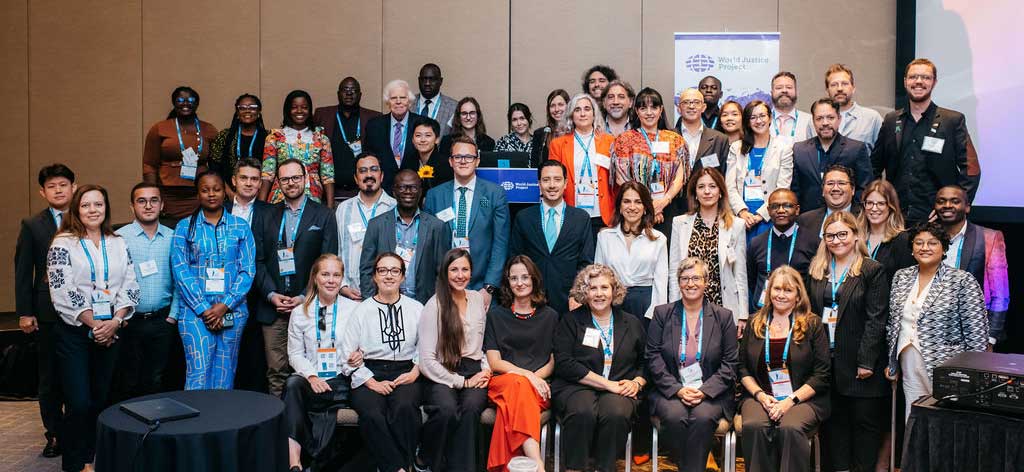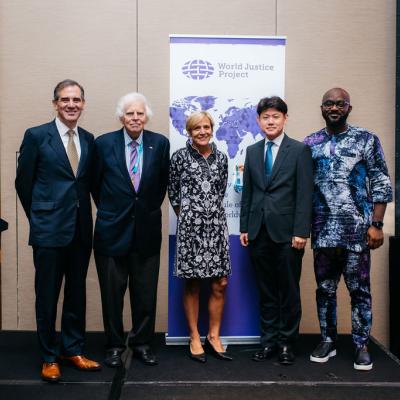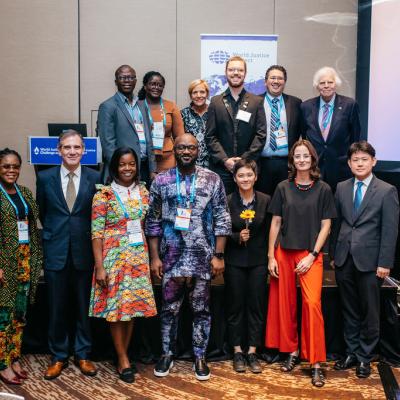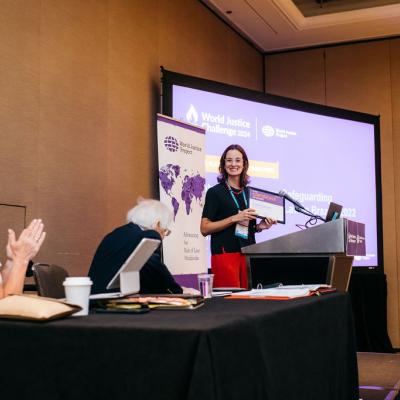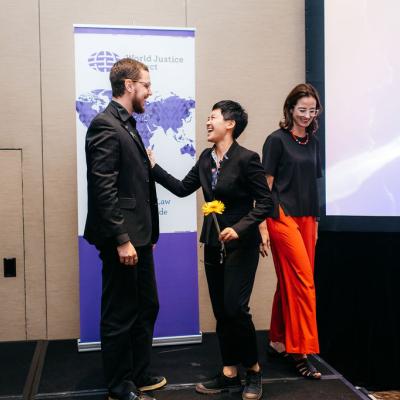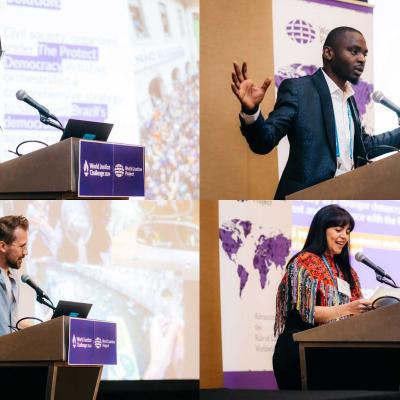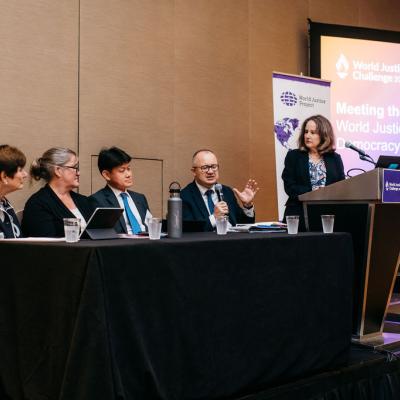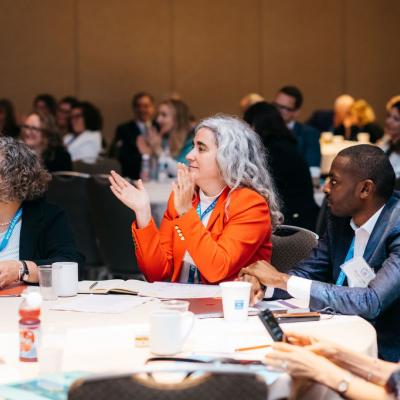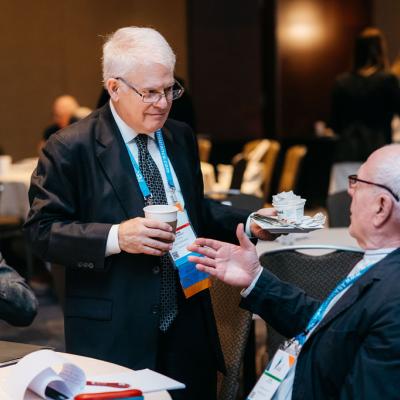
As world-class athletes faced off in the packed, flag-waving arenas of the Paris summer Olympics, another global contest was heating up in an understated hotel conference room some 4,000 miles away.
Beyond the $100,000 in awards at play, a palpable sense of higher stakes permeated the final round of the World Justice Challenge.
Before flying to compete in Chicago, the Venezuelan finalist had heard whispers he was on a new government watchlist amid post-election turmoil. The Berlin-based Azerbaijan team came to represent in-country journalist colleagues who remain anonymous to evade persecution. The Slovenian finalist had once been arrested for reading his nation’s constitution out loud, and the Zimbabwean team had seen blood flow after elections.
All 30 finalists selected from 424 competitors in 109 countries had compelling stories to tell, and that’s what they did at “Meeting the Challenge,” the World Justice Project’s one-day convening on strengthening the foundation of any successful democracy: the rule of law.
Global threats to democracy
Held at the 2024 annual meeting of the American Bar Association on August 1, the event gathered over 150 rule of law advocates to watch four thematic World Justice Challenge showcases and to discuss major threats to democracy, including disinformation with leaders from Microsoft and Internews, and attacks on judicial independence with justice practitioners from around the world.
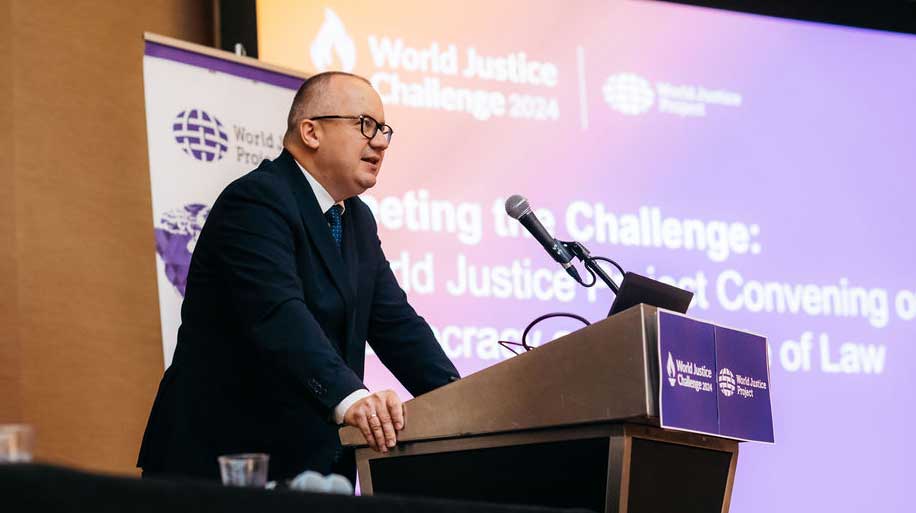
In his keynote speech on protecting a battered rule of law in his nation and beyond, the Polish Minister of Justice, Adam Bodnar, invoked the 80th anniversary of the Warsaw uprising against the Nazis, calling it “the symbol of the fight for freedom, democracy, and a better future.”
He recounted the hate and smear campaigns that he, as Poland’s former human rights ombudsman, as well as countless judges, prosecutors, activists, journalists, and academics had faced as they resisted the previous government’s moves to weaken the judiciary. He explained lessons learned from fixing a broken democracy, including that laws alone cannot guarantee the rule of law, and that institutions depend on citizens’ willingness to stand up for them.
Indeed, that is what so many of the World Justice Challenge finalists in the room have been doing around the globe, and why they had been invited to share their impact and convey the potential to replicate their innovative rule of law projects.
Youth-led civic action
In the contest for the Youth Engagement Prize, 31-year-old social entrepreneur Gabriel Marmentini recounted how nine years ago he drew on the momentum of student protests in Brazil to create Politize!, a wildly successful organization aimed at upholding democracy and “creating citizens” in a country with little tradition of civic education. He cited statistics that 30 percent of Brazilians aren’t sure if democracy is better than autocracy, and that 17% of Latin Americans believe autocracy is in fact better.
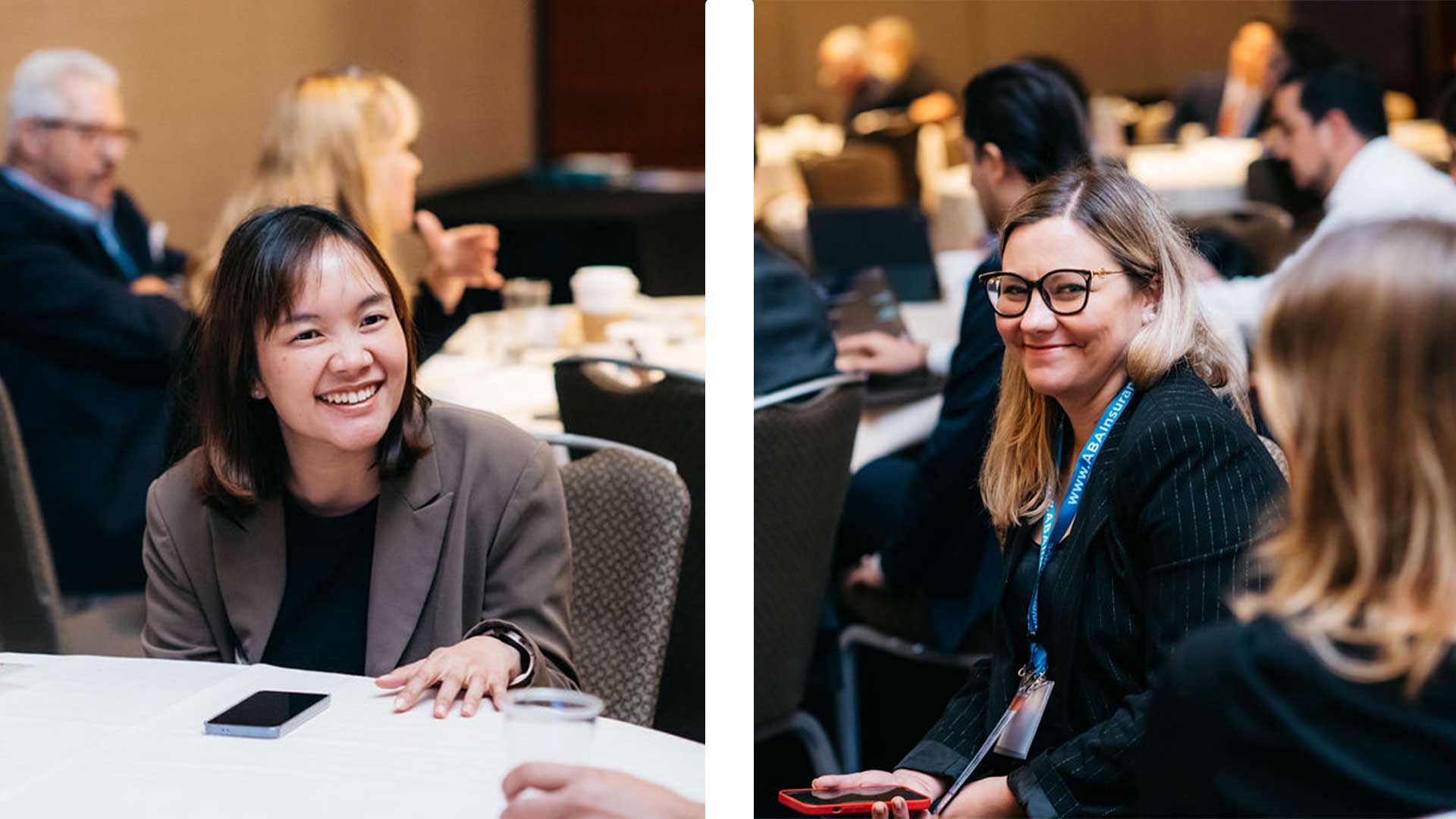
“So why not create an organization that is going to take care of democracy?” he asked. “And that is what we did. We share values, beliefs, practices, and knowledge to uphold democracy in Brazil through a network-based organization led by the youth.”
Already, half the population of Brazil has visited Politizei’s website; the group has trained more than 14,000 of the country’s teachers; and it recently launched websites in Mexico, Argentina, and Colombia to expand civic education in Spanish.
Later in the day, Politize! was announced as winner of both the Youth Engagement Prize and the alumni award voted on by the finalists of past World Justice Challenges. Smiling proudly, Marmentini took to the stage again and said he took a win as a sign to keep pushing forward, despite the challenges of a polarized nation.
Shark Tank for the rule of law
Before handing out the next awards, the president of the International Academy of Trial Lawyers, Karen Burgess, observed what a fun and inspiring day it had been.
“This is like Shark Tank for protecting and promoting the rule of law,” she said, “and I think you guys should get your own show!”
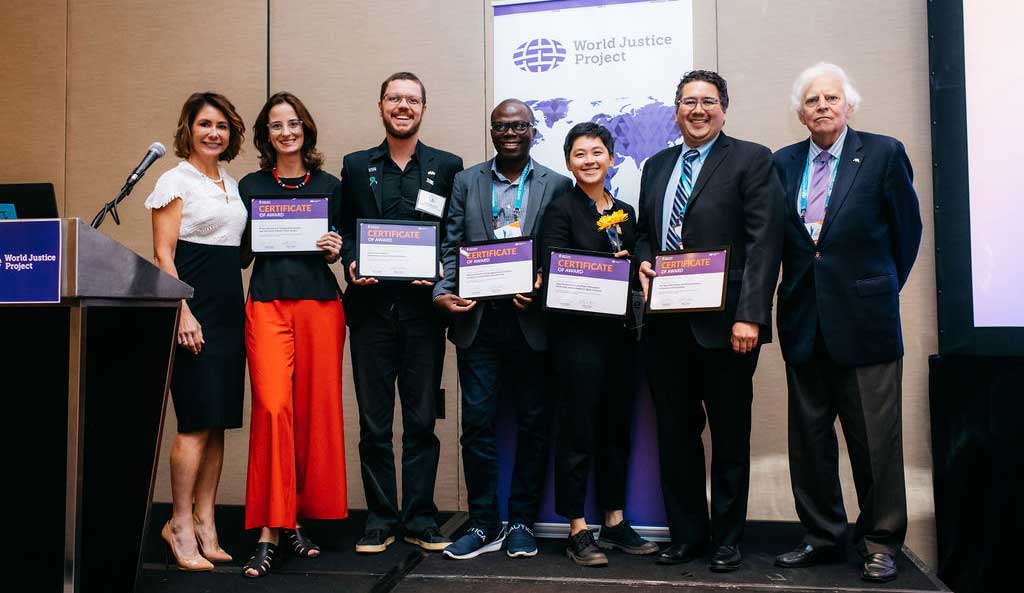
Burgess was among the distinguished panel of international judges that selected four additional World Justice Challenge winners: the Ghana based Media Foundation for West Africa, an investigative journalism collective aimed at rooting out corruption and impunity (Media and Information Prize); Common Cause, for its work making U.S. election redistricting inclusive, transparent, and nonpartisan (U.S. Building Trust Prize); Pacto Pelo Democracia, a Brazilian coalition of more than 200 civil society organizations forged to prevent election disruption ahead of Brazil’s contentious 2022 presidential contest (Electoral Processes Prize); and the Judicial Reform Foundation (JRF), which mobilized hundreds of lawyers to protect student protesters from police violence and government retribution in Taiwan (Justice Institutions Prize).
Courage is contagious
When hearing her organization announced as a winner, JRF’s Grace Huang jumped to her feet and joyfully raised a fresh-cut sunflower above her head. It is the symbol of the student protest movement her group has represented for a decade, including winning a 2021 Supreme Court case that recognized the Taiwanese people’s “right to resist.”
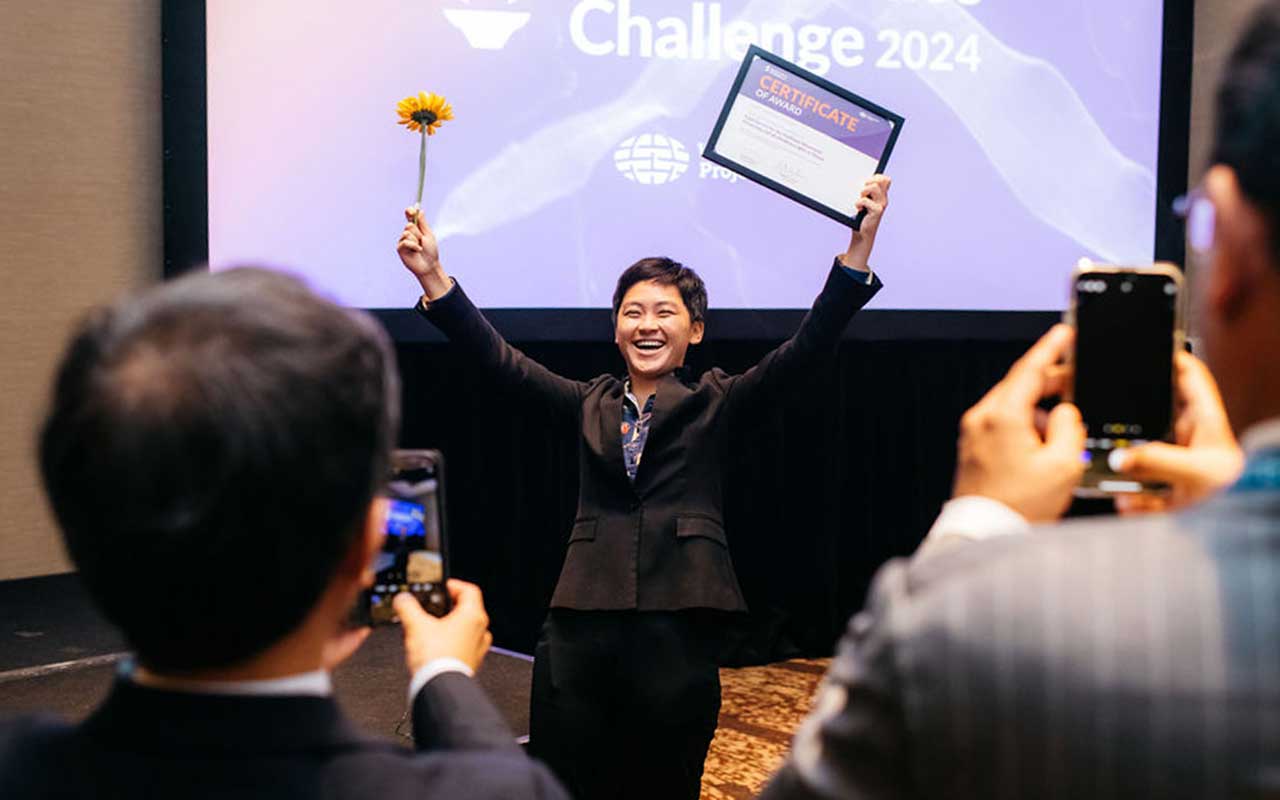
Taking the stage, the 29-year-old acknowledged the countless injustices occurring around the world, many of which had been explored over the course of the day. That, she said, might make people feel frustrated.
“But for me–and I believe for a lot of people–we also saw a lot of hope, and a lot of courage. And courage is contagious,” she said, smiling broadly.
“May we all be the super spreaders of courage when we go out of this room!”
“Meeting the Challenge” was made possible by the generosity of the International Academy of Trial Lawyers Foundation and Proteus Fund.
Special thanks to the World Justice Challenge 2024 judging panel: Lorenzo Córdova, former president of the Mexico National Electoral Institute; Hon. Karen F. Green, retired associate justice of the Massachusetts Superior Court; Judge Jiyong Jang, high court judge of the Suwon High Court in South Korea; Samson Itodo, executive director of Yiaga Africa; Linda Douglass, Former Head of Communications, Bloomberg Media; Suet-Fern Lee, WJP board member; Manon Olsthoorn, rule of law policy coordinator at the Netherlands Ministry of Foreign Affairs; and James R. Silkenat, former president of the American Bar Association and current WJP board member.


